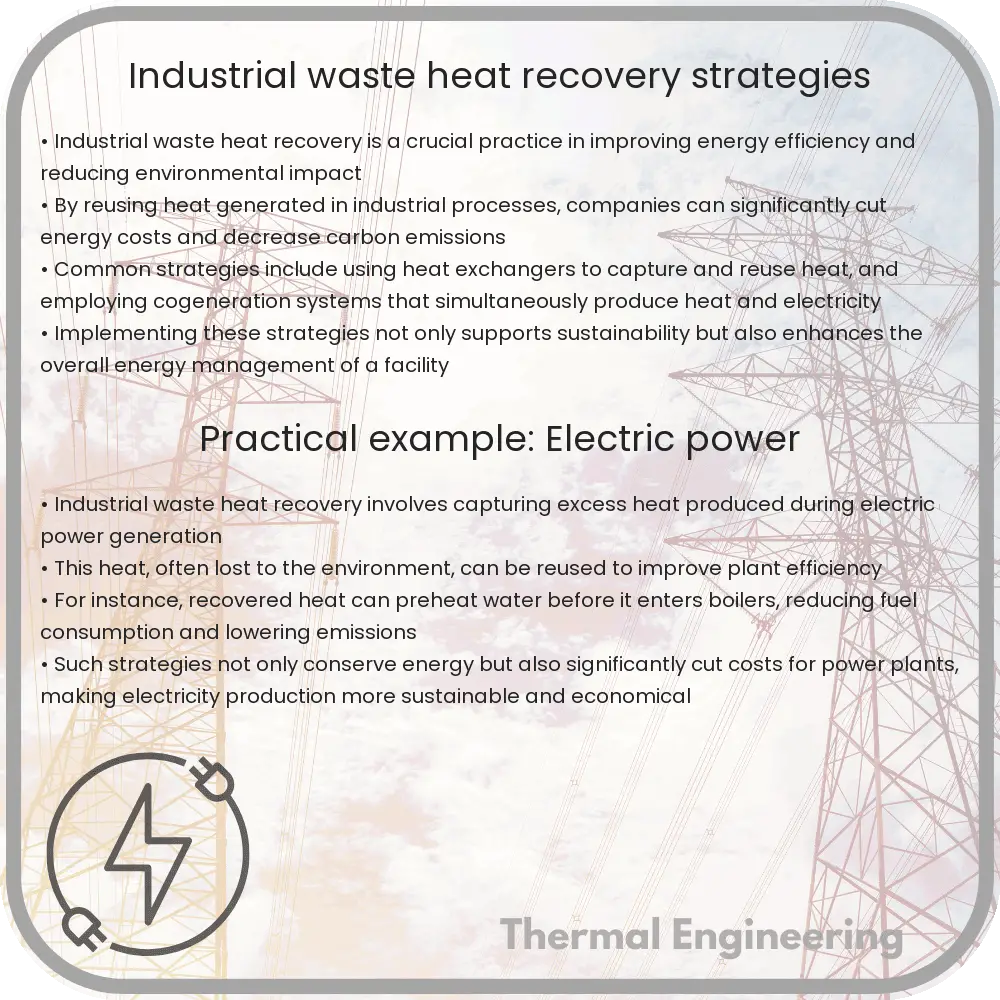Learn about the methods and benefits of industrial waste heat recovery, a process that captures and reuses excess heat from industrial activities.

Understanding Industrial Waste Heat Recovery
Industrial waste heat recovery refers to the process of capturing and reusing heat generated during industrial operations that would otherwise be lost to the environment. This recovered heat can be utilized to provide useful energy saving costs, and reducing environmental impacts. Here we will explore some of the most effective strategies used in industrial waste heat recovery.
Types of Waste Heat Recovery Systems
There are several technologies and processes designed to recover and utilize waste heat. The choice of a particular technology largely depends on the temperature of the waste heat and the desired use for the recovered energy.
- Heat Exchangers: One of the most common ways to recover waste heat involves using heat exchangers. These devices transfer heat from one fluid (gas or liquid) to another without mixing them. They are particularly effective for heat recovery in industries like chemical, petroleum, and food processing where high-grade heat is abundant.
- Waste Heat Boilers: These are used to convert water into steam by utilizing the heat from waste gases in industrial furnaces or engines. The generated steam can then be used for process heating, power generation, or both.
- Recuperators: A recuperator captures waste heat from exhaust gases to preheat incoming air to a furnace, boiler, or kiln. This significantly increases the system’s thermal efficiency by reducing the fuel requirement to achieve the desired heat output.
- Regenerative Thermal Oxidizers: These are used to destroy volatile organic compounds (VOCs) in exhaust gases by incineration and recover the resulting thermal energy for heating or generating electricity.
- Organic Rankine Cycle (ORC) Systems: ORC systems generate electricity from lower-temperature sources of waste heat (typically below 400°C). The system uses an organic working fluid with a boiling point lower than water, allowing energy extraction from low-grade heat sources.
Benefits of Waste Heat Recovery
Implementing waste heat recovery strategies in industrial settings offers numerous benefits:
- Energy Cost Savings: Recycling waste heat for other purposes reduces the overall energy consumption and the costs associated with it.
- Reduction in Emissions: By using recovered heat, the fossil fuel consumption decreases, thereby reducing greenhouse gas emissions and other pollutants.
- Enhanced Process Efficiency: Recovery and reuse of waste heat can improve the overall efficiency of the industrial process, leading to enhanced productivity.
- Competitive Advantage: Lower energy costs and a smaller carbon footprint can provide industrial entities a competitive edge in the market.
Challenges in Waste Heat Recovery
Despite its benefits, there are several challenges associated with the adoption of waste heat recovery systems:
- High Initial Investment: Setting up efficient waste heat recovery systems involves significant initial costs, which can be a barrier for many companies.
- Maintenance: Maintaining heat recovery systems can require skilled personnel and additional operational costs.
- Technical Limitations: Not all industrial waste heat is recoverable. The feasibility of recovery depends highly on the temperature and quality of the waste heat.
- Regulatory and Market Conditions: In some regions, the lack of stringent environmental regulations or incentives for energy conservation might diminish the attraction of investing in waste heat recovery technologies.
Conclusion
Industrial waste heat recovery presents a promising opportunity to enhance energy efficiency, reduce costs, and minimize environmental impact. Although challenges exist, the strategic implementation of recovery systems, driven by advancing technologies and a favorable regulatory landscape, can yield substantial benefits for industries worldwide. As businesses and economies increasingly focus on sustainability, the role of waste heat recovery is set to become more crucial than ever.